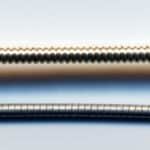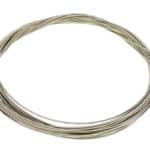Guitar strings are a must.
You can play without an amp, or even with a damaged guitar.
But can you really practice without strings? I don’t think so.
So, being such an important feature of every guitar, it’s no surprise many guitarists look for only the best of the best.
In other words, many musicians want the highest quality strings out there.
Also, they look for the proper way of changing them and setting them on the guitar.
There should not be a single flaw.
Of course, too many details prevent you from playing. You could simply add the first thing you have at hand and start off.
Does it matter if the strings are old? I don’t think so.
But most importantly, is it really relevant to play with strings of the same type?
Will I get the same results if I mix-match strings?
You can mix and match guitar strings. It doesn’t matter if they are of different brands, they will work perfectly. Just pay attention to their gauge, because otherwise, the way you play may feel completely different.
Let’s dig into this topic deeper.
Here, we’ll analyze different types of strings, and whether it’s a good idea to mix-match them or not.
Is it a good idea to mix and match guitar strings?
It’s possible to mix and match guitar strings.
Always ensure that you are setting up the instrument in the proper way.
Of course, what’s common is to purchase a full set of strings and play with them all. So, most often than not, you’ll find yourself using the same strings.
However, it could happen, for example, that only one or two strings break.
Maybe you do have backup strings from a different model, so you simply replace the broken ones.
In that case, you are mixing strings, but there won’t be any issues at all.
Can you mix and match between string brands?
If you have six strings from three different brands, then don’t worry. You can still play like that.
Nonetheless, there might be some differences regarding sound and playing.
Such differentiation won’t affect your results drastically. But of course, I believe it is worth mentioning them, just for you to keep them in mind.
So, for example, mix-matching strings of different brands could make a difference if some strings are coated and others are not.
Since coated strings have a protective extra layer, they add a more slippy feel that affects tone as well.
Also, strings could decay at different rates. If their quality is not balanced, then some are prone to sound dull quicker than the rest.
Again, these are details that, more often than not, will pass unnoticed. So don’t worry if you match brands.
Can you mix and match between string gauges?
Changes in string gauges are more specific than in string brands.
After all, gauges do affect the way one plays, and the overall feel.
Heavier gauge strings are tighter and you need more strength to push them against the fretboard.
If the gauge is thinner, then they require lesser finger strength.
But is it possible to combine them? In fact, it is!
It’s generally done by blocks, to maintain a certain balance and logic.
Let’s use an example to explain this.
Some brands sell sets of strings with a combination of gauges: The higher strings are 09s, lets’ say, and the thicker ones are 10s.
What this does is generate tighter tones on the lower register that maintain tension but are still comfortable to play with. This is especially great for bands that play in drop tunings such as Drop D, D standard, Drop C#, or Drop B.
What’s more, thinner higher strings make it simpler to play techniques like vibrato and bends.
To sum up, you can mix and match string gauges. However, it would be better if you balance higher strings of a certain gauge and lower ones with a different one.
Can you mix and match between string types?
Mix-matching string types is a possibility, but it depends on the type.
More specifically, you cannot use both nickel and nylon strings because nylon doesn’t work on electric guitars.
But what happens with flatwounds and roundwounds strings, for instance? Could you match them?
The answer is yes, you can.
It’s not uncommon for players to have both roundwounds and flatwounds in their instruments.
Needless to say, both are not alike.
On the one hand, roundwound strings have ridges between the wrap of the wrap wire, which adds a little bit of friction.
Their sound is bright and it is great for intensifying tones.
On the other hand, flatwound strings have almost no friction at all. This makes for a faster feel and a more slippery string.
Regarding the sound, flatwounds have a reduced high-end, which accentuates the mids and lows. It has a smoother and warmer sound too.
Lastly, consider that flatwounds usually create much more tension than roundwounds of the same gauge. This is because of their higher mass.
Should you set up your guitar after changing strings?
If you changed strings, then modifying the setup of a guitar is not a necessity.
In any case, you should check for some signs after applying changes: neck relief and fret buzz, just to name a few.
Also, you should consider setting it up only if the string changes are related to gauge or type of strings. Other than that, you’ll most probably be wasting your time.
If you are still unsure and want to know more about this topic in a more detailed way, then read the following article.
It has all the information necessary to dissipate all your doubts.
It’s a good idea to keep a spare set of strings with your instrument
Spare or backup strings can save you.
Just picture the following.
You are playing in front of an audience of hundreds or even thousands. You are having the best performance of your life, but all of a sudden, you break a string.
You have to replace it, but oh no! You didn’t get a spare set of strings to the show.
And you don’t have another guitar either. What are you gonna do now?
Ask for a borrowed guitar from someone in the opening band? No, they already left!
This situation is a bit of an exaggeration, I know. But one way or another, it’s a common scenario, and you should always be prepared.
A simply spare set can save you and avoid unnecessary regrets.
It doesn’t matter if the string types are different or if their gauge is too different from the others. It’s just a quick solution for a huge issue.
Hell, even some old and used guitar strings are helpful.
So yes, always have a backup string set.
And talking about used strings…
Can you re-use old strings alongside new ones?
Older strings are not that much of a big deal.
They sound dull and may get you a gloomier tone.
Some musicians enjoy the dark, almost lifeless sound that used strings create. Most often than not, however, guitarists prefer newer strings.
But all in all, old strings are still useful. They are not broken yet, so they still can resist a couple of rehearsals.
Plus, if the strings are not corroded, then they won’t damage either your fret or your fingers.
Get yourself a new set of strings, but whenever an emergency arrives, you can always go for some used strings until you get better ones. There won’t be any issues.
Lastly, I encourage you to read this article where we discuss this topic with more details and stronger facts.
Here it is.

Hello there, my name is Ramiro and I’ve been playing guitar for almost 20 years. I’m obsessed with everything gear-related and I thought it might be worth sharing it. From guitars, pedals, amps, and synths to studio gear and production tips, I hope you find what I post here useful, and I’ll try my best to keep it entertaining also.





